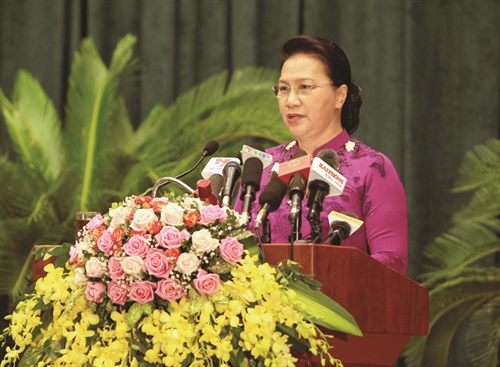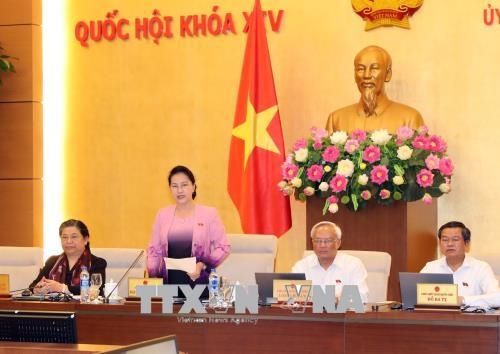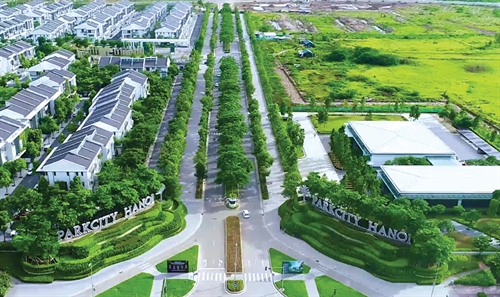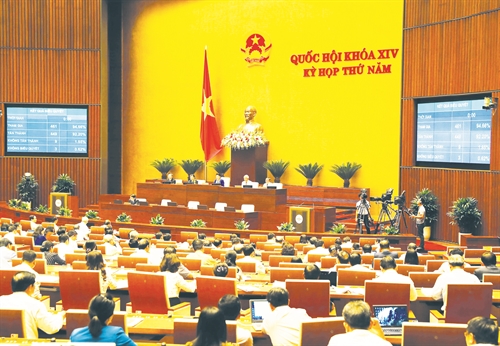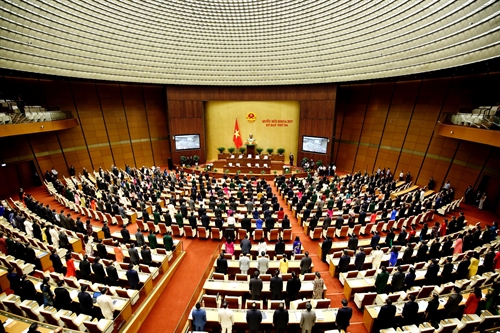Building e-government and then developing digital government and digital economy constitute a great policy that needs to be accelerated in the coming time, Minister-Chairman of the Government Office Mai Tien Dung highlighted in a recent article.
The Vietnamese Party and State have always attached importance to the application of information technology (IT) in the operation of state agencies, considering it a driving force for accelerating the renewal process and creating shortcuts so as to attain success in the national industrialization and modernization.
In 2014, the Party Political Bureau issued Resolution 36 on promoting IT application and development to meet the demand for sustainable development and international integration along the direction of “applying and developing IT in all areas with some of them identified as key and focus ones; prioritizing IT application in administrative management and public service provision, especially in sectors related to enterprises and people such as education, health, transport and agriculture, etc.” The Resolution also sets the target that by 2020, the national administrative reform program will achieve certain successes and contribute to the building of e-government and provision of online public services in many fields.
In early 2015, the Government, for the first time, issued a resolution focusing on e-government, aiming to “accelerate the development of e-government, improving operational quality and effectiveness of state agencies, and better serving people and businesses.” The Government also set to raise the country’s ranking in the annual e-government surveys of the United Nations and publicize and transparentize the operation of state agencies in the cyber environment.
 |
| The new interface of the Government Portal |
Ministers, sectors and localities have attained initial results in e-government building and development, Dung noted. The legal foundation for IT application has been step by step established. A number of important national databases such as those on enterprise registration, insurance, population and land have been built and partially put into operation. State agencies have managed to provide online several essential public services, including enterprise registration, tax and customs declaration, tax payment, and social insurance. In some localities, electronic single-window information portals have been put into place, thus improving transparency and enhancing responsibility of state personnel.
However, Dung wrote, the result of e-government building and development is still below expectations. Vietnam’s ranking in the 2018 United Nations e-government survey remains at the middle level. According to the United Nations’ latest report, in the past two years, the country jumped just one step to the 88th position among 193 countries and territories in the survey. Within the ASEAN, Vietnam is now standing at the modest ranking of sixth.
According to the head of the Government Office, there are several causes that can be attributed to such poor result.
Tasks of e-government building and development are being performed at a slow pace and, at some places, in a formalistic manner. The building of national databases and IT infrastructure facilities serving as the foundation for e-government development is far behind schedule. Information and data systems are not yet connected to one another and timely and accurately updated. Some information systems still fail to ensure information safety and security, while national accountability in e-transactions remains low. State agencies seem to focus on increasing the number of public services available online but ignore the fact that the percentage of e-dossiers successfully processed is tiny while administrative procedures are still performed manually, requiring a lot of paperwork. There exist institutional barriers, causing difficulties to enterprises in the implementation of investment projects on IT application. As a result, leaders of many central agencies and sectors can hardly obtain digital information on subjects under their management.
Additionally, many agencies or sectors have not yet identified specific roadmaps and tasks to launch online services in areas under their management. They also fail to properly combine IT application with reform of administrative procedures and renovation of working styles, especially in the relations with people and businesses. Platforms for integration and sharing of data among state administrative agencies as well as regulations on data integration and sharing mechanisms are insufficient, while due attention is not paid to assurance of information safety and security for information systems of state agencies. Particularly, Vietnam now lacks a synchronous legal framework on e-government development as well as specific regulations on authentication of e-transactions and legal validity of e-documents in administrative and payment transactions. The mechanism for guaranteeing the performance of related tasks by ministries, sectors and localities is not strong enough. Meanwhile, the State still fails to promote the participation of the private sector and adopt an appropriate financial and investment mechanisms for IT projects.
In the context of the fourth industrial revolution, Vietnam should complete its foundation for e-government development and then gear up toward digital economy and digital society, Dung justified.
To achieve a breakthrough in e-government building and development, according to Dung, the Government Office is now working on a draft resolution on a number of tasks and solutions for e-government development in the 2018-2020 period, with orientations toward 2025.
The draft resolution lays down the following five major tasks for the Government to focus on from now till 2020:
Firstly, to speed up the formulation and improvement of institutions so as to create a complete and comprehensive legal framework for e-government building and establishment.
In light of this, several decrees on data sharing, protection of personal data and privacy, electronic authentication, among others, will be enacted. In the immediate future, a decree replacing Government Decree 102 of 2009 on IT application in the operation of state agencies and Prime Minister Decision 80 of 2014 on hiring IT services will be adopted. At the same time, the formulation of a law on e-government and its guiding texts will be considered in order to lay a legal foundation for e-government development based on open data and new technologies.
Secondly, to complete national databases serving as the foundation for e-government building and development.
Together with the formulation of institutions, efforts will also be concentrated on the building of national databases serving as the foundation for e-government development with special importance attached to the national population and land databases. Additionally, in order to ensure their effective use, these national databases will be built based on an integrated platform that enables the sharing of data between information systems at the central and local levels and ensures the transferability among the Government’s special-use digital signature authentication system, public digital signature authentication systems, and national payment portals, etc.
Thirdly, to establish the system of applications serving people, enterprises, and the Government’s management and administration work.
At present, the Government Office and other ministries, sectors and localities are working hard to build a national public service portal and deploy an electronic single-window information system linked to public service portals of ministries, sectors and localities. In addition, in order to serve the Government’s management and administration work, in the coming time, a paperless information system, an e-system on policy consultancy and a national information and reporting system will be developed serving the formation of an administration center of the Government and Prime Minister.
Fourthly, to review, re-arrange and mobilize all human and financial resources serving e-government development.
In order to improve the efficiency of investment in IT application projects, it is necessary to review, re-arrange and mobilize resources for the performance of prioritized e-government development tasks, adopt a special mechanism for investment in IT application projects, and increase socialization so as to promote the effectiveness of public-private partnership in the sector.
Additionally, the effectiveness of public information about e-government, digital economy and digital infrastructure must be improved through implementation of propagation programs aiming to raise awareness, change behaviors and habits, and create social consensus about the development of the e-government.
Lastly, to promote the role of heads of agencies and units as well as their work performance efficiency and accountability.
As directed by the Prime Minister, a National Committee on E-Government will be soon established on the basis of consolidating the National Committee on Application of Information Technology. The new committee will be composed of the Prime Minister as its chairman and heads of related ministries and sectors as its members. Worth of note, the private sector will have its representatives in the committee. This is expected to help improve the effectiveness of public-private partnership projects. The performance of tasks related to the building of e-government by each ministry, sector or locality will be evaluated in association with personal responsibility of its head by using a set of indicators.- (VLLF)


